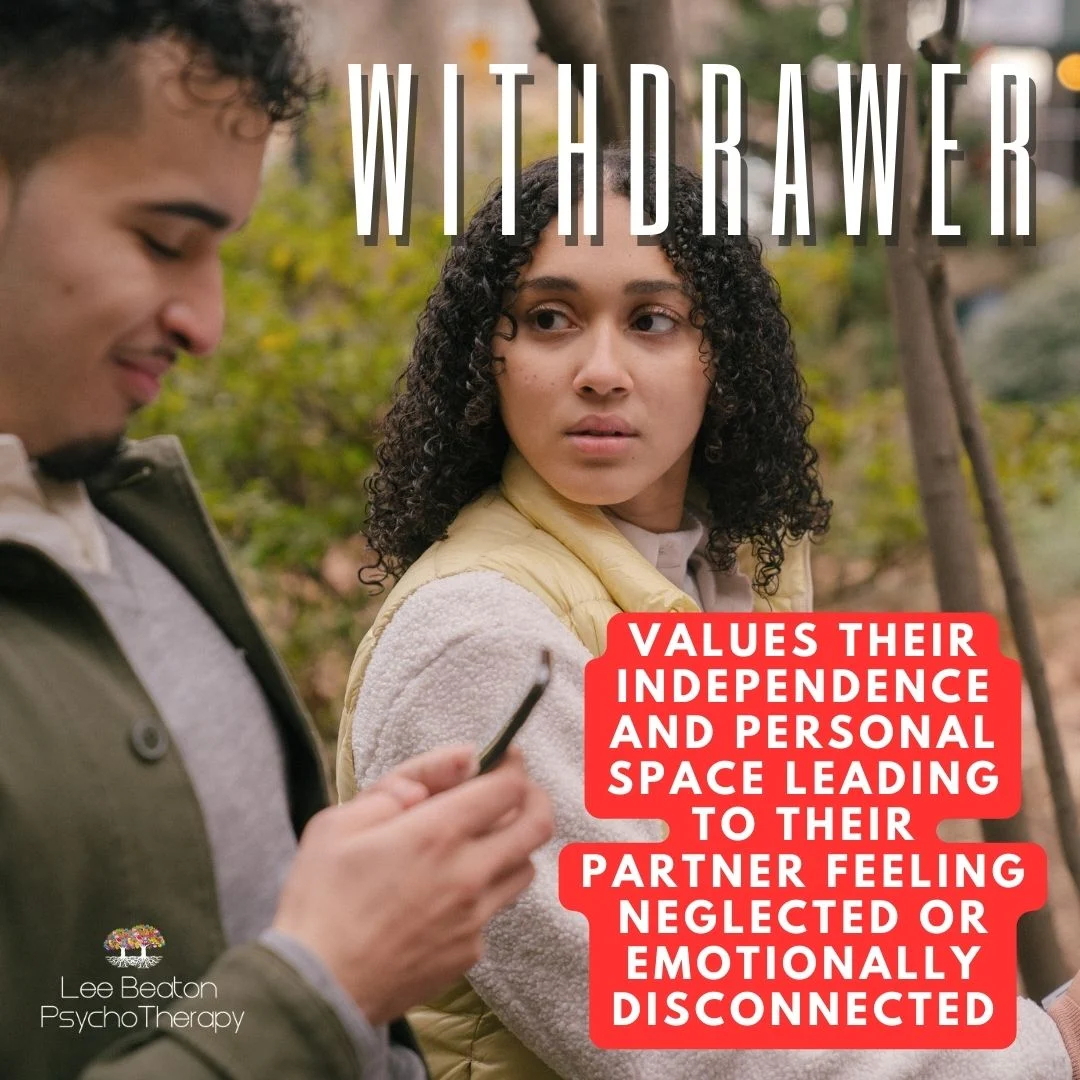Love is a captivating journey that takes us through exhilarating highs and challenging lows. Within the realm of relationships, understanding the intricate dance between partners is essential for fostering healthy connections. One concept that sheds light on this dynamic interplay, that comes from Emotional Focused Therapy (EFT), is the fascinating roles of the Demander and Withdrawer in relationships. Over the next few weeks we will be unravelling their complexities and offering insights into how you can build stronger emotional bonds with your partner.
Imagine a scenario where one partner feels a strong urge to seek closeness, emotional validation, and reassurance. This partner is often labelled as the “Demander”.
Craving emotional intimacy, the Demander yearns for deep emotional connection, desiring a sense of closeness and security within the relationship. They often take the lead in initiating conversations and activities to bridge the perceived emotional distance. The Demander may harbor deep-seated fears of being abandoned or rejected, leading them to seek reassurance and attention from their partner.
The intensity of the Demander’s emotional needs can be overwhelming for both themselves and their partner, sometimes leading to emotional exhaustion. Their fear of rejection may cause them to become anxious, clingy, or possessive, inadvertently pushing their partner away. The Demander may struggle with regulating their emotions independently, relying heavily on their partner for emotional support.
Contrasting the Demander, the Withdrawer seeks emotional distance in order to protect their sense of autonomy and manage anxiety. They may feel overwhelmed by the Demander’s emotional demands and need space to process their own feelings before reconnecting.
The Withdrawer values their independence and personal space, often needing time alone to process emotions and to recharge. They may avoid conflicts or intense emotional discussions to reduce discomfort, seeking to maintain a sense of peace within the relationship. The Withdrawer may have a deep-seated fear of being overwhelmed or engulfed by their partner’s emotional intensity.
Challenges for the Withdrawer can include their need for space and emotional distance leading to their partner feeling neglected or emotionally disconnected. The Withdrawer’s need for autonomy might be misinterpreted as indifference or lack of care by the Demander, leading to misunderstandings. They may find it challenging to express their feelings openly and vulnerably, as they are more accustomed to internalizing and managing emotions independently.
In many relationships, the Demander and Withdrawer engage in a dance that perpetuates their respective roles, often leading to cycles of frustration and misunderstanding. The Demander’s pursuit triggers the Withdrawer’s withdrawal, creating a self-reinforcing pattern that can erode the relationship over time.
Other dances may involve Demander and Demander or Withdrawer and Withdrawer, none of them fun.
Understanding the dynamics of the Demander and Withdrawer can help us navigate the intricacies of our relationships more effectively. Emotional Focused Therapy provides valuable insights into the needs, fears, and behaviours of these roles, guiding us toward building stronger emotional connections and fostering a love that thrives on understanding, empathy, and mutual growth. By embracing vulnerability, engaging in open communication we can break free from the demand-withdrawal dance or any other negative cycle and forge a path toward greater love, fulfillment and connection in our relationships. Remember it’s the cycle that is causing the pain, not the partner.
Are you a Demander or a Withdrawer? Test yourself with this exercise from Dr Sue Johnson’s Hold Me Tight Workbook.
Lee Beaton
Relationship Counsellor
Lee Beaton is an accredited Gestalt Psychotherapist; an accredited Awakening Joy Facilitator; a qualified practitioner in the evidence-based EFT with couples, and in The Richards Trauma Process (TRTP). Her approach is based on the latest advances in working with trauma, therapeutic change and neuroplasticity, and in particular how compassion and gratitude can be used to rewire the body and the brain.
To subscribe to Lee’s Newsletters click here.
Please call Lee on 0491 638 124 to discuss further or make a booking.
www.leembeaton.com









Leave A Comment